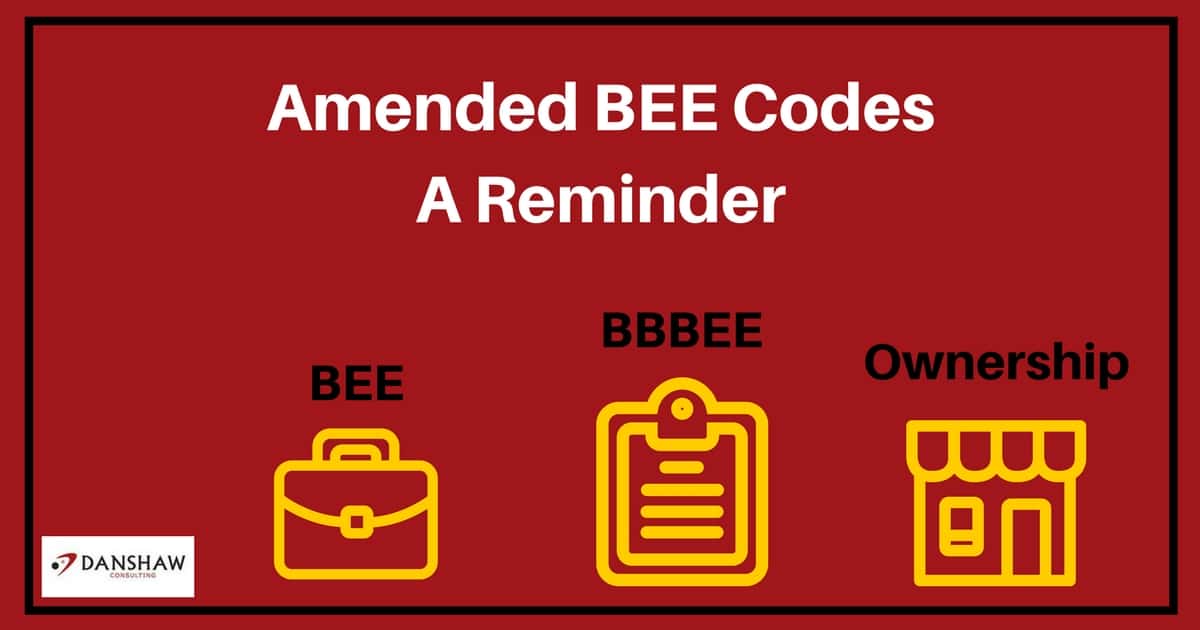Amended codes For BEE – A Reminder

The amended codes for Broad-Based Black Economic Empowerment (B-BBEE) that came into effect in May 2015 continue to cause confusion and anxiety among business owners in South Africa.
The amended codes are stricter, especially with regards to scoring and the manner in which B-BBEE compliance levels are calculated.

Previously – 7 categories for compliance:
- Ownership,
- Management control,
- Employment equity,
- Skills development,
- Preferential procurement,
- Enterprise development and
- Socio-economic development.
New B-BBEE Codes – Only 5 categories for compliance:
- Ownership – weighing 25 points.
- Management control (incorporates employment equity) – weighing 19 points.
- Skills development – weighing 20 points, with a possible 5 points extra.
- Enterprise & supplier development (incorporates preferential procurement). Generic = weighing 40 points, with a possible 4 points extra. QSE = weighing 30 points.
- Socio-economic development – weighing 5 points with.
Major changes to the codes include changes in Ownership, Skills Development and Enterprise, as well as in Supplier Development categories, which will become priority elements.
It is important for businesses not only to understand these codes, but also to consider and develop strategies that will help them ensure their ongoing compliance with the amended codes.
Compliance with the amended codes will help businesses remain competitive by minimizing the risk of losing clients or work as the result of noncompliance.
The amendments to the BEE codes mean that black business ownership and involvement in social change are now the most lucrative activities on the scale.
The new codes also promote learnerships, such as graduate programs and internships, whereas the old codes only emphasized job creation.
More reading – Broad-Based Black Economic Empowerment, Wikipedia
Furthermore, the new codes dictate that up to 6% (QSE is 3% and Generic is 6%) of the annual leviable payroll must be set out for skills development, compared to just 3% under the old legislation.
Gender recognition will also be taken into account on Generic Entity above 50mil turnover.
The amended code is veritable gold for companies in the smaller businesses realm.
Companies with an annual turnover of R10 million or less now qualify as Exempt Micro Enterprises (EMEs), and are awarded automatic Level 4 status (level 1 indicates maximum B-BBEE compliance, while level 8 is the lowest) even if there is no black ownership.
Should they have 10% black ownership, they will be upgraded to a level 1. This is a big change, as the threshold for qualifying as an EME was previously limited to R5 million or less.
Furthermore, companies who bring in between 10 and 50 million annually are now classified as Qualifying Small Enterprises (QSEs).
Previously, only companies bringing in between R5 million and R35 million were classified as QSEs. While QSEs only had to comply with four categories under the old legislation, they are now obligated to comply with all five.
If these QSEs are 51% black owned, they can be awarded level 2 status, whereas 10% black ownership earns them a level 1 qualification. Neither EMEs nor QSEs, as long as they have at least 51% black ownership, need official verification by a B-BBEE agent.
An affidavit setting out their annual income and black ownership details is sufficient.
The new codes may therefore make it more difficult to obtain high B-BBEE compliance statuses/ratings.
Some companies may also have been downgraded based on the adjusted points calculation when the new codes came into effect.
However, with careful revision and the assistance of a B-BBEE consultant, companies can get back – and stay – on track.










